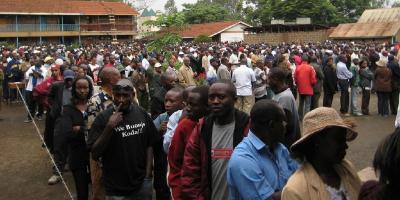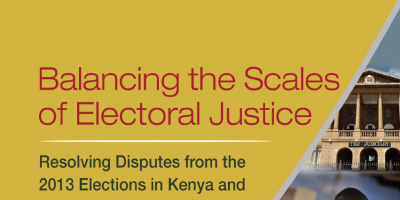
In Kenya, electoral disputes can generate powerful emotions, leading to conflict, unrest and even violence. Electoral dispute resolution (EDR) remains a critical element in the electoral cycle that helps secure the integrity of elections and also curbs electoral-related violence. This remains a particular concern in Kenya especially given the post-election violence in 2007.
As opposed to being a democratic process where winners would emerge and the opposition would prepare for a future election, the declaration of the Presidential results on 30th December 2007 was met with public denouncement and subsequently followed by violence in several parts of the country. This required the intervention of the international community and many ongoing efforts to reclaim the confidence of the Kenyan public.
With the 2007 post-election violence in mind, establishing effective, timely and fair electoral dispute resolution processes under the Judiciary remains a high priority. The Constitution of Kenya, 2010 carried the promise of free, peaceful and credible elections by mandating expeditious and fair electoral dispute resolution, consistent with the standard of international frameworks. The Judiciary was put at the centre of this process, with a mandate to arbitrate and determine election disputes within six months.
Following the 2013 EDR process and in the run up to the General Elections in 2017, IDLO and the Judicial Training Institute (JTI) published a book analysing lessons learned from Kenya’s 2013 General Elections and the critical role of the Judiciary in resolving electoral disputes. The publication addresses key issues relevant to Kenyan institutions, the Judiciary, contestants in elections, those intending to file election petitions, as well as the wider Kenyan electorate who can benefit from a greater understanding of the processes and jurisprudence developed regarding electoral dispute resolution in Kenya.
Analysis of the 2013 Kenyan EDR process includes issues of key concern – gender, evidence, and alternative justice mechanisms - while also highlighting ongoing efforts and preparations underway for the 2017 elections. These lessons learned provide a roadmap of operations to build upon past achievements and advance ongoing transformations in Kenya. Recommendations hold the ultimate goal of ensuring preparedness of the Judiciary to resolve disputes in 2017, furthering Sustainable Development Goal 16 of peace, justice and strong institutions, and inspiring confidence among citizens.
Photo Credit: Ian Schuler, Flickr 2007
Publication for viewing or download Balancing the Scales of Electoral Justice: Resolving Deputes from the 2013 Elections in Kenya



